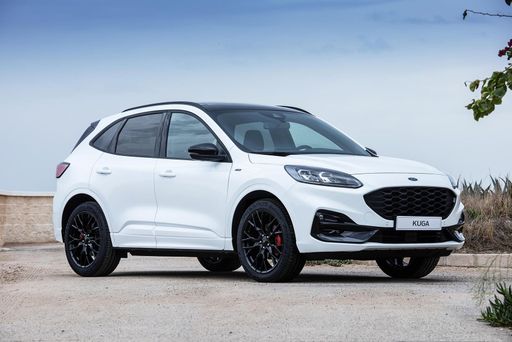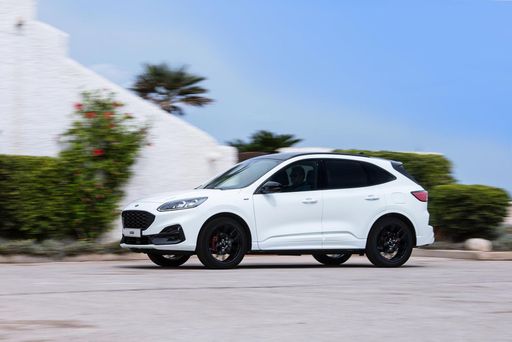Ford Kuga vs Toyota Prius – Which one offers the better deal?
Costs and Efficiency:
Price and efficiency are often the first things buyers look at. Here it becomes clear which model has the long-term edge – whether at the pump, the plug, or in purchase price.
Ford Kuga has a slightly advantage in terms of price – it starts at 34200 £, while the Toyota Prius costs 39400 £. That’s a price difference of around 5178 £.
Fuel consumption also shows a difference: Toyota Prius manages with 0.50 L and is therefore significantly more efficient than the Ford Kuga with 2.80 L. The difference is about 2.30 L per 100 km.
As for range, the Toyota Prius performs noticeable better – achieving up to 86 km, about 18 km more than the Ford Kuga.
Engine and Performance:
Power, torque and acceleration say a lot about how a car feels on the road. This is where you see which model delivers more driving dynamics.
When it comes to engine power, the Ford Kuga has a minimal edge – offering 243 HP compared to 223 HP. That’s roughly 20 HP more horsepower.
In acceleration from 0 to 100 km/h, the Toyota Prius is minimal quicker – completing the sprint in 6.80 s, while the Ford Kuga takes 7.30 s. That’s about 0.50 s faster.
In terms of top speed, the Ford Kuga performs slightly better – reaching 200 km/h, while the Toyota Prius tops out at 177 km/h. The difference is around 23 km/h.
Space and Everyday Use:
Whether family car or daily driver – which one offers more room, flexibility and comfort?
Both vehicles offer seating for 5 people.
In curb weight, Ford Kuga is slight lighter – 1526 kg compared to 1620 kg. The difference is around 94 kg.
In terms of boot space, the Ford Kuga offers noticeable more room – 412 L compared to 284 L. That’s a difference of about 128 L.
When it comes to payload, Ford Kuga clearly perceptible takes the win – 550 kg compared to 375 kg. That’s a difference of about 175 kg.
Who comes out on top?
Overall, the Toyota Prius shows itself to be is largely superior and secures the title of DriveDuel Champion.
It convinces with the more balanced overall package and proves to be the more versatile choice for everyday use.
Costs and Consumption
View detailed analysis
Engine and Performance
View detailed analysis
Dimensions and Body
View detailed analysis
 @ Toyota Motor Corporation
@ Toyota Motor Corporation
Toyota Prius
Ford Kuga
The Kuga is Ford’s adaptable family SUV that blends usable space with a surprisingly lively driving character, making daily commutes and weekend escapes equally enjoyable. With smart interior packaging, an easy-to-use infotainment setup and composed road manners, it’s a sensible choice for buyers who want a bit of fun without the fuss.
details @ Ford Motor Company / Ford Media Center
@ Ford Motor Company / Ford Media Center
 @ Ford Motor Company / Ford Media Center
@ Ford Motor Company / Ford Media Center
 @ Ford Motor Company / Ford Media Center
@ Ford Motor Company / Ford Media Center
Toyota Prius
The Prius glides through traffic like a wise commuter's secret weapon, balancing miserly running costs with an unflappable sense of reliability. It's not a thrill seeker, but its roomy cabin, sensible packaging and low-stress driving personality make it a brilliant choice for buyers who value peace of mind over pulse-raising performance.
details @ Toyota Motor Corporation
@ Toyota Motor Corporation
 @ Toyota Motor Corporation
@ Toyota Motor Corporation
 @ Toyota Motor Corporation
@ Toyota Motor Corporation
 @ Toyota Motor Corporation
@ Toyota Motor Corporation
 @ Ford Motor Company / Ford Media Center
@ Ford Motor Company / Ford Media Center
|
 @ Toyota Motor Corporation
@ Toyota Motor Corporation
|
|
|
|
Costs and Consumption |
|
|---|---|
|
Price
34200 - 46300 £
|
Price
39400 - 45800 £
|
|
Consumption L/100km
2.8 - 6.8 L
|
Consumption L/100km
0.5 - 0.7 L
|
|
Consumption kWh/100km
-
|
Consumption kWh/100km
-
|
|
Electric Range
68 km
|
Electric Range
72 - 86 km
|
|
Battery Capacity
1.1 - 14.4 kWh
|
Battery Capacity
-
|
|
co2
55 - 154 g/km
|
co2
12 - 17 g/km
|
|
Fuel tank capacity
42 - 54 L
|
Fuel tank capacity
40 L
|
Dimensions and Body |
|
|---|---|
|
Body Type
SUV
|
Body Type
Hatchback
|
|
Seats
5
|
Seats
5
|
|
Doors
5
|
Doors
5
|
|
Curb weight
1526 - 1859 kg
|
Curb weight
1620 - 1630 kg
|
|
Trunk capacity
412 L
|
Trunk capacity
284 L
|
|
Length
4604 - 4645 mm
|
Length
4599 mm
|
|
Width
1882 mm
|
Width
1782 mm
|
|
Height
1673 - 1681 mm
|
Height
1470 mm
|
|
Max trunk capacity
1534 L
|
Max trunk capacity
-
|
|
Payload
541 - 550 kg
|
Payload
365 - 375 kg
|
Engine and Performance |
|
|---|---|
|
Engine Type
Petrol, Full Hybrid, Plugin Hybrid
|
Engine Type
Plugin Hybrid
|
|
Transmission
Manuel, Automatic
|
Transmission
Automatic
|
|
Transmission Detail
Manual Gearbox, CVT, Automatic Gearbox
|
Transmission Detail
CVT
|
|
Drive Type
Front-Wheel Drive, All-Wheel Drive
|
Drive Type
Front-Wheel Drive
|
|
Power HP
150 - 243 HP
|
Power HP
223 HP
|
|
Acceleration 0-100km/h
7.3 - 9.9 s
|
Acceleration 0-100km/h
6.80 s
|
|
Max Speed
195 - 200 km/h
|
Max Speed
177 km/h
|
|
Torque
240 Nm
|
Torque
-
|
|
Number of Cylinders
3 - 4
|
Number of Cylinders
4
|
|
Power kW
111 - 178 kW
|
Power kW
164 kW
|
|
Engine capacity
1496 - 2488 cm3
|
Engine capacity
1998 cm3
|
General |
|
|---|---|
|
Model Year
2025
|
Model Year
2023
|
|
CO2 Efficiency Class
E, D, B
|
CO2 Efficiency Class
B
|
|
Brand
Ford
|
Brand
Toyota
|
What drivetrain options does the Ford Kuga have?
The Ford Kuga is available as Front-Wheel Drive or All-Wheel Drive.
The prices and data displayed are estimates based on German list prices and may vary by country. This information is not legally binding.
